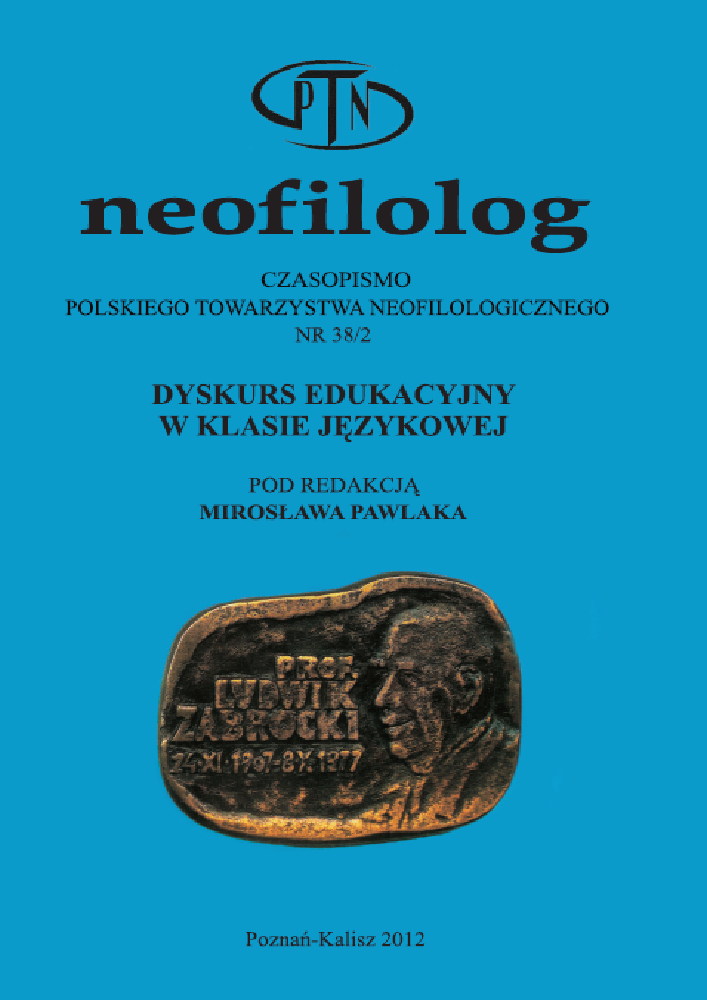Abstrakt
This article discusses different approaches to authentic communication, pro-posing a new definition of authentic communication in educational discourse, based on this author’ s application of Sperber and Wilson’s (1986/1995) Relevance Theory to functions of target and native language in the lan-guage classroom. According to the proposed definition, authentic com-munication in the L2 classroom refers to such uses of teachers and stu-dents’ communication which provides students both with linguistic data (positive input) and facilitates the learning process by explicitly focusing their attention on linguistic forms (negative input). After outlining some fundamental principles of Relevance Theory, the author exemplifies func-tions of the target language (English) and the mother tongue (Polish) in authentic communication in educational discourse in three stages of L2 lessons: in explicit grammar teaching, in fluency practice and in real class-room communication. Although it is claimed that the mother tongue should be preserved in monolingual teaching contexts, primarily for iden-tification and affective reasons, excessive use of the native language re-duces the target language to the function of a teaching object and, conse-quently, makes the educational discourse unauthentic.
Bibliografia
Block, D. 2007. Second language identities. London: Continuum.
Breen, M. 1985. „Authenticity in the language classroom”. [w:] Applied Linguistics 6: 60-70.
Carroll, S. 1995. „The irrelevance of verbal feedback to language learning”. [w:] Eubank, L., Selinker, L. i Sharwood-Smith, M. (red.). Interlanguage: Studies in honour of W. E. Rutherford. Amsterdam – Philadelphia: John Benjamins. 73-88.
Fryc, A. 2000. „Using communicative activities in Polish secondary schools”. Nieopublikowana praca magisterska. Kraków: Uniwersytet Jagielloński.
Guariento, W. i Morley, J. 2001. „Text and task authenticity in the EFL class-room”. [w:] ELT Journal 55: 347-353.
Kramsch, C. 2009. The multilingual subject. Oxford: Oxford University Press.
Majer, J. 2003. Interactive discourse in the foreign language classroom. Łódź: Wydawnictwo Uniwersytetu Łódzkiego.
Niżegorodcew, A. 1997. „First language use in the second language classroom in the light of SLA research”. [w:] Mazur, Z. i Bela, T. (red.). New development in Eng-lish and American studies: Continuity and change. Kraków: Universitas. 631-642.
Niżegorodcew, A. 2007. Input for instructed L2 learners: The relevance of relevance. Clevedon: Multilingual Matters.
Pawlak, M. 2006. The place of form-focused instruction in the foreign language classroom. Poznań – Kalisz: Wydawnictwo Wydziału Pedagogiczno-Artystycznego UAM.
Puchała, D. 1993. „EFL classroom uses of Polish (L1) and English (L2) by non-native teachers of English”. Nieopublikowana praca magisterska. Kra-ków: Uniwersytet Jagielloński.
Przebinda, A. 2004. „Discussion or role-play? Helping secondary school learners develop their speaking skills”. Nieopublikowana praca magisterska. Kra-ków: Uniwersytet Jagielloński.
Sperber, D. i Wilson, D. 1986/1995. Relevance: Communication and cognition. Ox-ford: Blackwell.
Wilson, D. i Sperber, D. 2004. „Relevance theory”. [w:] Horn, L. i Ward, G. (red.). Handbook of pragmatics. Oxford: Blackwell. 607-632.
Licencja
Prawa autorskie (c) 2012 Anna Niżegorodcew

Utwór dostępny jest na licencji Creative Commons Uznanie autorstwa – Bez utworów zależnych 4.0 Międzynarodowe.
Przedstawiany utwór (artykuł) upubliczniany jest na podstawie umowy z autorem i na licencji Creative Commons Attribution-NoDerivatives 4.0 International (CC BY-ND 4.0).
Użytkownicy mają obowiązek podania wraz z rozpowszechnionym utworem, informacji o autorstwie, tytule, źródle (odnośniki do oryginalnego utworu, DOI) oraz samej licencji;
- bez tworzenia utworów zależnych,
- utwór musi być zachowany w oryginalnej postaci.
Uniwersytet im. Adama Mickiewicza w Poznaniu zachowuje prawo do czasopisma jako całości (układ, forma graficzna, tytuł, projekt okładki, logo itp.).
